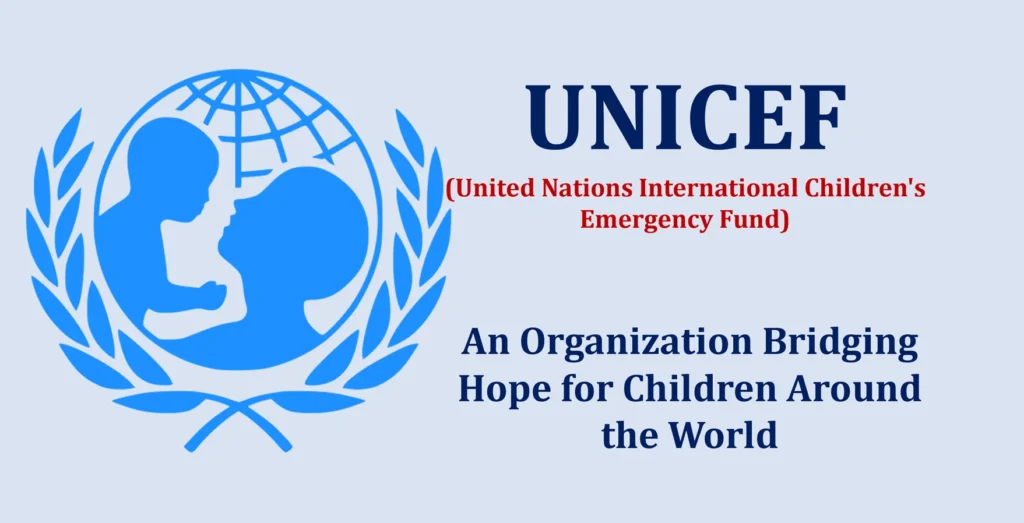
Introduction to UNICEF
Origin and History of UNICEF
The United Nations International Children’s Emergency Fund was established on December 11, 1946, by the United Nations General Assembly. Originally known as the United Nations International Children’s Emergency Fund, UNICEF was created to provide emergency food and healthcare to children in countries devastated by World War II. The organization’s initial focus was on addressing the urgent needs of children affected by conflict, poverty, and disease. Over time, its mandate expanded beyond emergency relief to encompass long-term development programs aimed at improving the lives of children worldwide.
Mission and Vision of UNICEF
Its mission is to ensure the survival, protection, and development of every child, everywhere. The organization works to uphold the rights of every child, as outlined in the United Nations Convention on the Rights of the Child (CRC).
Its vision is a world where every child has the opportunity to thrive, free from poverty, discrimination, violence, and disease. Through its programs and initiatives, it strives to create a world where all children have access to education, healthcare, clean water, nutrition, and protection from harm.
Core Principles and Values of UNICEF
- Equity: It believes in fair and equal access to resources and opportunities for every child, regardless of their background or circumstances.
- Diversity and Inclusion: It promotes respect for the diversity of cultures, beliefs, and identities, and advocates for the inclusion of all children, including those with disabilities and from marginalized communities.
- Integrity: It upholds the highest standards of ethics, transparency, and accountability in its operations and partnerships.
- Collaboration: It works in partnership with governments, civil society organizations, communities, and other stakeholders to achieve common goals for children.
- Innovation: It embraces innovation and technology to find new and creative solutions to the challenges facing children and communities.
- Advocacy: At the local, national, and international levels, it promotes laws and initiatives that give children’s rights and welfare top priority.
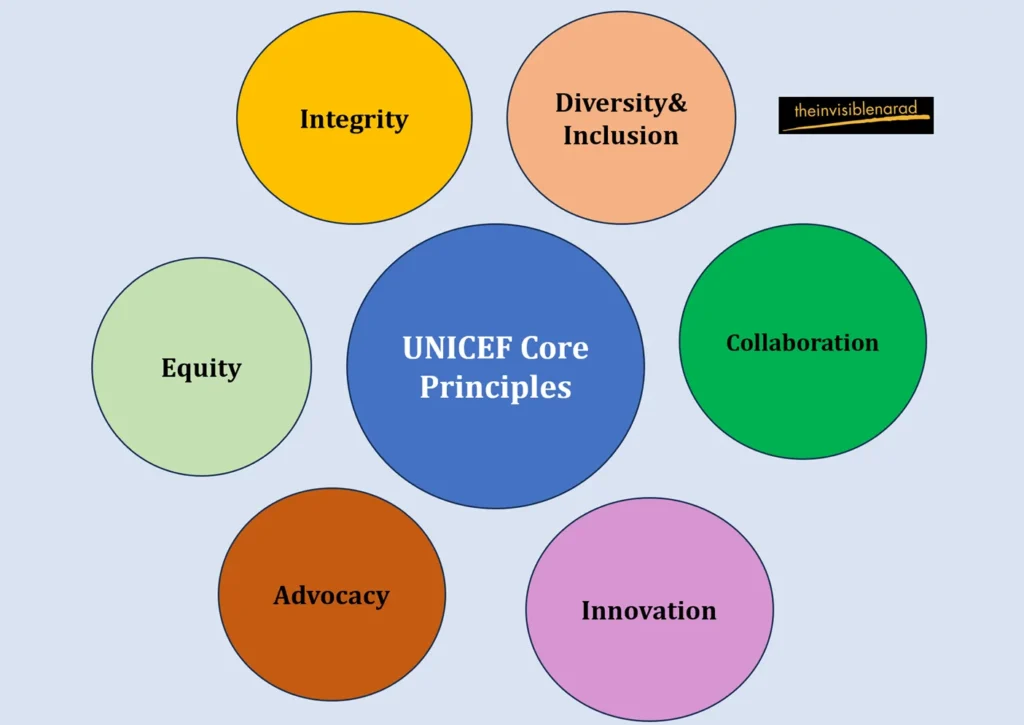
UNICEF is a global organization dedicated to championing the rights and well-being of children everywhere, with a history rooted in humanitarian action and a vision for a brighter future for every child. Its core principles and values guide its efforts to make this vision a reality, working in partnership with governments, communities, and other stakeholders to build a world where every child can thrive.
Areas of Focus for UNICEF
Health and Nutrition Initiatives
Health and nutrition are foundational elements of UNICEF’s work, as they are essential for children’s survival, growth, and development. It implements a range of initiatives aimed at improving maternal and child health, preventing diseases, and addressing malnutrition.
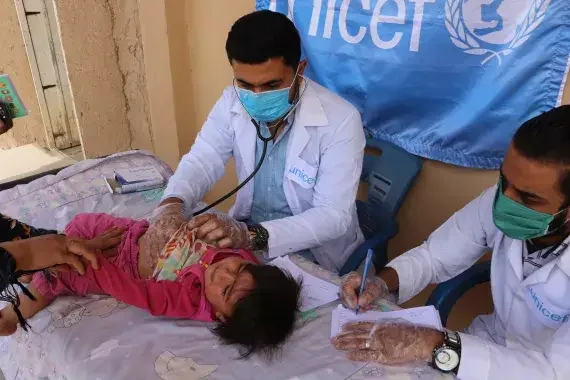
- Vaccination campaigns: It supports vaccination programs to protect children from preventable diseases such as measles, polio, and tetanus.
- Maternal and newborn health: It works to ensure that pregnant women have access to prenatal care, skilled birth attendants, and postnatal support to reduce maternal and neonatal mortality rates.
- Nutrition programs: It provides nutritional supplements, therapeutic foods, and education to address malnutrition and stunting among children, particularly in vulnerable communities.
- Water, sanitation, and hygiene (WASH): It promotes access to clean water, sanitation facilities, and hygiene education to prevent waterborne diseases and improve overall health outcomes for children and families.
Education and Child Protection Programs
Education is a fundamental right and key to breaking the cycle of poverty and inequality. Every child should have access to a high-quality education and a secure learning environment, according to UNICEF’s mission.
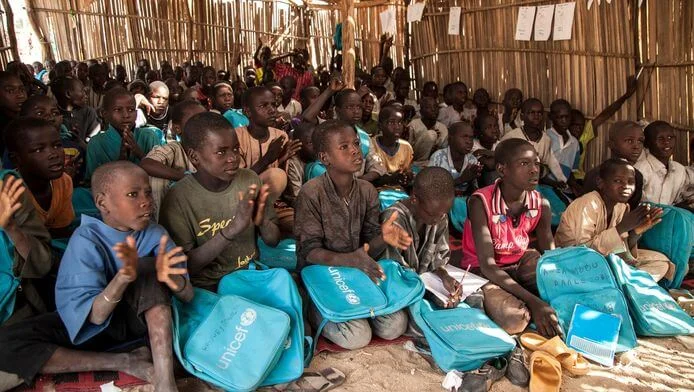
- Education programs: It supports efforts to expand access to schools, improve educational infrastructure, and enhance the quality of teaching and learning.
- Child protection: It advocates for the rights of children to be protected from violence, abuse, exploitation, and neglect. The organization works to strengthen child protection systems, raise awareness, and provide support services for vulnerable children and families.
- Birth registration: It helps governments establish systems for birth registration, ensuring that every child has a legal identity and access to essential services and protections under the law.
- Gender equality: It promotes gender equality in education and child protection, advocating for equal opportunities for boys and girls to learn, grow, and thrive.
Emergency Relief and Humanitarian Assistance Efforts
It is at the forefront of humanitarian response, providing lifesaving assistance to children and families affected by emergencies, including conflicts, natural disasters, and public health crises.
- Emergency supplies: It delivers essential supplies such as food, water, shelter, and medical supplies to affected populations in the immediate aftermath of emergencies.
- Healthcare services: It supports mobile clinics, emergency medical teams, and health facilities to provide critical healthcare services to children and families in crisis-affected areas.
- Psychosocial support: It offers psychosocial support and counseling to help children cope with the trauma and emotional distress caused by emergencies.
- Education in emergencies: It works to ensure that children affected by emergencies have access to safe and supportive learning environments, even during times of crisis.
UNICEF’s areas of focus encompass health and nutrition initiatives, education and child protection programs, and emergency relief and humanitarian assistance efforts. By addressing these key areas, it aims to ensure that every child has the opportunity to survive, thrive, and reach their full potential, regardless of their circumstances or the challenges they face.
Global Impact of UNICEF
Advocacy and Policy Influence on Children’s Rights
- It plays a crucial role in advocating for the rights and well-being of children at the global, regional, and national levels.
- Through research, analysis, and evidence-based advocacy, UNICEF works to shape policies, laws, and programs that promote children’s rights and address the root causes of inequality, discrimination, and poverty.
- It advocates for the implementation of international agreements such as the Convention on the Rights of the Child (CRC) and the Sustainable Development Goals (SDGs), which provide a framework for protecting and promoting children’s rights and well-being.
- By engaging with governments, policymakers, civil society organizations, and the private sector, UNICEF amplifies the voices of children and advocates for their rights to survival, development, protection, and participation in decisions that affect their lives.
Collaborations and Partnerships with Governments and Nonprofits
- It recognizes the importance of collaboration and partnerships in achieving its mission to improve the lives of children worldwide.
- The organization works closely with governments, United Nations agencies, civil society organizations, community groups, and the private sector to leverage resources, expertise, and networks to deliver results for children.
- Through strategic partnerships, it expands its reach, scales up its programs, and maximizes its impact on the ground.
- Collaborative initiatives with other organizations focus on a wide range of issues, including health, education, child protection, water and sanitation, emergencies, and innovation.
- By fostering partnerships based on shared values and goals, it creates synergies and mobilizes collective action to address complex challenges facing children and communities around the world.
Data-Driven Approaches for Measuring Success and Progress
- It employs data-driven approaches to monitor progress, evaluate the effectiveness of its programs, and make evidence-based decisions to improve outcomes for children.
- The organization collects and analyzes data on key indicators related to child survival, health, nutrition, education, protection, and well-being.
- It utilizes a variety of tools and methodologies for data collection, including household surveys, health facility assessments, administrative records, and innovative technologies such as mobile data collection and geographic information systems (GIS).
- Data analysis helps it identify disparities, trends, and areas of need, enabling targeted interventions and resource allocation to reach the most vulnerable children and communities.
- It also advocates for improved data systems and capacity building to strengthen national and global efforts to monitor progress towards the achievement of children’s rights and the SDGs.
UNICEF’s global impact is reflected in its advocacy and policy influence on children’s rights, collaborations and partnerships with governments and nonprofits, and data-driven approaches for measuring success and progress. Through these strategic initiatives, UNICEF works to advance the rights and well-being of every child, everywhere, and build a better future for generations to come.
Challenges and Criticisms
Funding and Resource Constraints
- One of the primary challenges facing UNICEF is the ongoing struggle to secure adequate funding and resources to support its programs and initiatives.
- Despite its critical mission and widespread impact, it relies heavily on voluntary contributions from governments, private donors, and philanthropic organizations.
- Economic downturns, competing humanitarian crises, and shifting political priorities can affect the availability and predictability of funding for UNICEF’s work.
- Resource constraints may limit the organization’s ability to scale up successful programs, reach marginalized populations, and respond effectively to emerging challenges, including natural disasters, conflicts, and health emergencies.
Cultural and Societal Barriers in Implementing Programs
- It operates in diverse cultural, political, and social contexts around the world, where entrenched traditions, beliefs, and practices may pose challenges to the implementation of its programs and interventions.
- Cultural norms and societal attitudes related to gender, ethnicity, religion, and child-rearing practices can influence the acceptance and adoption of UNICEF’s recommendations and strategies.
- Improving child well-being and addressing issues like child marriage, female genital mutilation, and gender-based violence may be hampered by resistance to change, fear of stigmatization, and a lack of knowledge or understanding about children’s rights and health issues.
- It works collaboratively with local communities, religious leaders, and traditional authorities to promote dialogue, raise awareness, and foster culturally sensitive approaches to programming and advocacy.
Effectiveness and Transparency in Operations
- As with any large organization operating on a global scale, UNICEF faces scrutiny and criticism regarding the effectiveness and transparency of its operations.
- Concerns may arise about the efficiency of resource allocation, the impact of programs on target populations, and the measurement and reporting of outcomes and results.
- Questions about accountability, governance structures, and decision-making processes within UNICEF may be raised by donors, stakeholders, and the general public.
- It is committed to maintaining high standards of accountability, transparency, and integrity in its operations. The organization regularly conducts evaluations, audits, and reviews to assess the effectiveness and impact of its programs and ensure compliance with established policies and procedures.
- UNICEF also promotes transparency through open communication, public reporting, and engagement with stakeholders, including the publication of annual reports, financial statements, and performance data.
It is widely recognized for its vital role in protecting and promoting children’s rights worldwide, it faces significant challenges and criticisms related to funding and resource constraints, cultural and societal barriers, and effectiveness and transparency in operations. Addressing these challenges requires ongoing commitment, collaboration, and innovation to ensure that UNICEF can fulfill its mission and make a meaningful difference in the lives of children and families everywhere.
Success Stories and Achievements
UNICEF’s interventions and programs have led to numerous success stories and positive outcomes for children and communities worldwide. These achievements underscore the organization’s commitment to improving the lives of the most vulnerable populations and advancing children’s rights globally.
Examples of successful UNICEF interventions and programs
- Immunization Campaigns
- UNICEF’s efforts to promote immunization have contributed to significant reductions in child mortality rates from preventable diseases such as measles, polio, and diphtheria.
- Immunization campaigns, supported by UNICEF, have reached millions of children in remote and underserved communities, protecting them from life-threatening illnesses and helping to achieve global immunization targets.
- Access to Clean Water and Sanitation
- It works to improve access to clean water, sanitation facilities, and hygiene education in communities around the world.
- It has assisted millions of children and families in gaining access to clean drinking water and sanitation services through programs like the WASH (Water, Sanitation, and Hygiene) program, which lowers the risk of waterborne illnesses and improves general health outcomes.
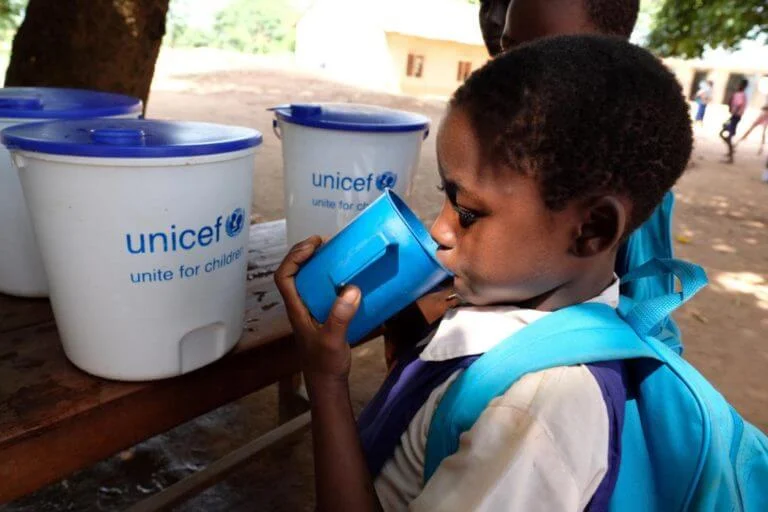
- Education and Child Development
- UNICEF’s education programs focus on expanding access to quality education, promoting inclusive learning environments, and empowering children to reach their full potential.
- Through initiatives like the Schools for Africa program, UNICEF has helped build schools, train teachers, and provide educational materials to children in disadvantaged communities, enabling them to gain knowledge, skills, and opportunities for a better future.
- Child Protection and Welfare
- It advocates for the protection and welfare of children, working to prevent and respond to violence, exploitation, abuse, and neglect.
- Through child protection programs, UNICEF provides support services, legal assistance, and psychosocial support to children who have experienced trauma or exploitation, helping them heal and rebuild their lives in safe and nurturing environments.
Impact stories showcasing positive outcomes for children and communities
- In conflict-affected regions such as Syria, Iraq, and South Sudan, UNICEF’s emergency response efforts have provided lifesaving assistance, including food, water, healthcare, and education, to millions of children and families displaced by violence and instability.
- In countries like Bangladesh and Ethiopia, UNICEF’s nutrition programs have helped reduce malnutrition rates among children, improve maternal and child health outcomes, and strengthen health systems to ensure access to essential nutrition services.
- In communities affected by natural disasters such as hurricanes, earthquakes, and floods, UNICEF’s rapid response teams have provided emergency relief supplies, shelter, and medical care to affected populations, helping them recover and rebuild their lives in the aftermath of crises.
These success stories and achievements demonstrate the transformative impact of UNICEF’s work in promoting children’s rights, protecting their well-being, and building a more equitable and sustainable future for all. Through continued collaboration, innovation, and commitment, UNICEF strives to create a world where every child has the opportunity to thrive and reach their full potential.
Future of UNICEF
As UNICEF looks to the future, several key areas will shape its mission and initiatives to promote children’s rights and well-being globally.
Innovation and Technology in Addressing Children’s Issues
It recognizes the transformative potential of innovation and technology in addressing the complex challenges facing children and communities worldwide. The organization embraces innovative solutions and digital technologies to improve the delivery of essential services, enhance data collection and analysis, and empower children and youth to participate in decision-making processes. Initiatives such as UNICEF Innovation Labs and partnerships with tech companies, startups, and academia enable UNICEF to develop and scale innovative solutions that address emerging issues, including access to education, healthcare, clean water, and protection from harm.
Sustainable Development Goals and UNICEF’s Role
It is committed to advancing the Sustainable Development Goals (SDGs) and achieving measurable progress towards the targets set for children’s rights, health, education, gender equality, and environmental sustainability. The SDGs provide a roadmap for UNICEF’s work and guide its efforts to address interconnected challenges such as poverty, inequality, climate change, and conflict, which impact children’s well-being and future opportunities. UNICEF collaborates with governments, civil society organizations, and other stakeholders to align policies, programs, and investments with the SDGs and accelerate progress towards achieving the goals by 2030.
Advocacy for Children’s Rights in a Changing World
In a rapidly changing world marked by globalization, urbanization, technological advancements, and geopolitical shifts, UNICEF remains steadfast in its commitment to advocating for children’s rights and protection. UNICEF adapts its advocacy strategies to address evolving threats and opportunities, including emerging forms of exploitation, discrimination, and violence against children. The organization champions the voices of children and youth, amplifies their concerns, and mobilizes support for policies and programs that prioritize their rights, safety, and well-being in a changing world.
Conclusion & FAQs
UNICEF’s vital role in promoting children’s rights and well-being is more critical than ever as the world faces unprecedented challenges and uncertainties. As we look to the future, it is essential to recognize the enduring importance of UNICEF’s mission and the need for collective action to protect and empower every child, everywhere.
In conclusion, I urge readers to support UNICEF’s mission and advocate for children’s rights worldwide. By standing together and taking action, we can build a more just, inclusive, and sustainable world where every child has the opportunity to thrive and reach their full potential. Let us commit ourselves to the vision of a future where children are safe, healthy, educated, and empowered to shape their own destinies and contribute to the well-being of their communities and societies. By working together, we can ensure that future generations have a brighter future.
Frequently Asked Questions (FAQs)
What is UNICEF, and what does it do?
UNICEF, the United Nations International Children’s Emergency Fund, is a UN agency dedicated to promoting the rights and well-being of children worldwide. UNICEF works in over 190 countries and territories to provide lifesaving assistance, education, healthcare, nutrition, clean water, protection, and support to children and families, particularly in emergencies and disadvantaged communities.
How is UNICEF funded?
UNICEF relies on voluntary contributions from governments, private donors, philanthropic organizations, and corporate partnerships to fund its programs and initiatives. Donations to UNICEF support a wide range of activities aimed at improving the lives of children, including emergency response, health and nutrition programs, education, child protection, and advocacy efforts.
How does UNICEF ensure accountability and transparency in its operations?
UNICEF maintains high standards of accountability, transparency, and integrity in its operations and financial management. The organization undergoes regular audits and evaluations to assess the effectiveness and impact of its programs, ensure compliance with established policies and procedures, and promote transparency in reporting. UNICEF publishes annual reports, financial statements, and performance data to provide stakeholders with information on its activities, achievements, and expenditures.
How does UNICEF respond to humanitarian emergencies and crises?
UNICEF has a rapid response mechanism to provide lifesaving assistance and support to children and families affected by humanitarian emergencies, including conflicts, natural disasters, and public health crises. UNICEF’s emergency response efforts focus on delivering essential supplies, such as food, water, shelter, healthcare, and education, to affected populations, as well as providing psychosocial support and protection services for children in crisis-affected areas.
How can individuals support UNICEF’s mission and work?
There are several ways individuals can support UNICEF’s mission and work, including making donations, fundraising, volunteering, and advocating for children’s rights. Donations to UNICEF help fund programs and initiatives that improve the lives of children worldwide. Individuals can also participate in fundraising events, volunteer their time and skills, and raise awareness about children’s issues and UNICEF’s work in their communities and networks. Additionally, individuals can advocate for policies and investments that prioritize children’s rights, health, education, and protection at the local, national, and global levels.
